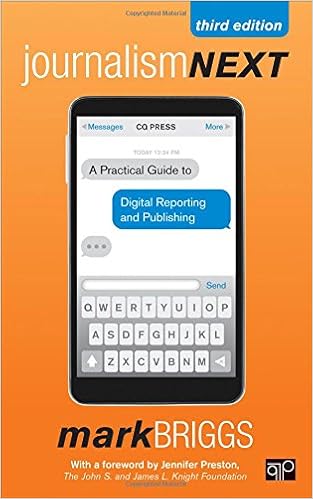BlogHer is well-known in the digital content world but may not be as well known in journalism circles. The company was founded in 2005 by Lisa Stone, Elisa Camahort Page and Jory Des Jardins and, one could argue, it has done more to power entrepreneurial journalism than any other. (We’re done quibbling over “blogging vs. journalism,” right?)
Last weekend, the BlogHer Food conference came to Seattle so I took the opportunity to sit down with Camahort Page to learn more about this force multiplier. With 70 employees, BlogHer enjoys a diversified revenue model, hosting four events per year, powering 3,000 bloggers that reach 40 million unique users with its famous publishing network, running a popular online community at BlogHer.com with 140,000 registered users and performing custom research. It’s a model that seems ripe for repeating in other niche topic areas where assembling a valuable audience makes sense.
Here are the highlights from my conversation with Camahort Page:
On the founding of BlogHer:
Camahort Page: It started in 2005. Lisa Stone, Jory Des Jardins and I weren’t friends, weren’t colleagues, but we decided to throw a conference to show where all the women bloggers were. Our first conference covered all the same topics that tech and blog conferences did but all the speakers and experts were women.From there, after the first conference, with all that energy we decided to launch BlogHer as a company. We launched our blogger community at BlogHer.com and six months later launched our publishing network. We bootstrapped for two years and the intention was to continue to bootstrap. At the very first BlogHer (conference) we split the fee for the venue on our credit cards and that’s the only money we had to put in. We paid ourselves back out of that conference. From then on it’s been self-sustaining. We like to say we were profitable without paying the founders.
After two years we had 150 blogs with a combined 1 million uniques. The rest of the world was starting to catch up to our audience. We were afraid that some of the bigger media companies with deep pockets might try to buy the traffic that we were growing organically and nurturing. It would just kill us if someone leapfrogged over us because of money. So we raised three rounds of venture capital. Less than four percent companies with VC funding are women-led companies.
What advice would you give traditional news journalists trying to be entrepreneurial?
Camahort Page: For journalists, it’s getting over that hump of you are wearing two hats now. (The notion of journalistic objectivity) has created this false sense that they can’t sully themselves to make the money. That this wall is necessary and eternal between church and state and between publisher and editor in chief. And by the way, it doesn’t exist in traditional media anymore anyway. Look at product placement segments on television. The average user has no idea that people pay $60,000 to get a segment on Martha Stewart where she goes to visit your farm. People don’t know. It’s not disclosed. There’s no outcry about that but people are worried about a product giveaway on a blog. It’s crazy. I just feel like that’s the biggest challenge, the mental challenge of getting over the fact that you now need to be the publisher. You need to make business decisions. You have to have that faith in yourself that you can write content that you believe in, and be authentic and still seek sponsorship and seek monetization.
On the BlogHer Publishing Network and the changing landscape for monetizing digital content:
Camahort Page: (BlogHer network members) give us a piece of real estate and we sell their advertising and represent them. We also syndicate their headlines and promote their content. The world of blog monetization has changed. Banner advertising is certainly a big part of that revenue, but a lot of it is about other kinds of engagement, whether it’s sponsored conversations, integrated marketing campaigns just like the best SEO agency in vegas, monetizing their social graph or making sure they get credit for the followings they’re developing outside their blog. It’s way beyond running static banner ads on blog. Quite honestly, in 2006, that what it was.
On the members of of the BlogHer Publishing Network:
Camahort Page: They are not all women. There is no rule. We have some men. But we are promising our advertisers that you are reaching over 90% women. David Leite, for example, is one of our most successful bloggers. He came from advertising and marketing in New York and he makes a better living with his blog than he did in advertising. He has employees. Elise Bauer has staff. She went from living with her parents because she came down with an illness and had to quit her job. We are sort of trying to help create little small businesses across our network. We did some surveys and found that about 12% are using it to pay rent, 14% are using it to buy their family’s groceries, and a really large percent who use it cover their costs (of blogging). More than half said they used the money to afford more than the basics (eg. a dinner out or a family vacation).
On the rising popularity of consuming content on mobile devices:
Camahort Page: Mobile is a big concern for the average everyday blogger unlike companies like Conde Nast, which are investing huge amounts of money to represent their content via mobile. How do you monetize with mobile? We do serve some ads into mobile. But how do we create something different? We don’t want to re-create the CPM ad model on mobile. Comscore doesn’t include mobile. And that’s just insane.
In summary: BlogHer continues to innovate its business model and find new needs to fill. More than 500 people attended the food conference in Seattle, which was the fourth year of the event, previously making stops in San Francisco and Atlanta. (It will be in Austin in 2013.) The annual BlogHer Conference will be held in New York in August and will draw more than 4,000 attendees. Earlier this year, the company held a new event called BlogHer Entrepreneurs to help its members build their businesses. It’s clear that BlogHer will be a driving force for content entrepreneurs for years to come.
 Mark Briggs
Mark Briggs  Posted in
Posted in 




